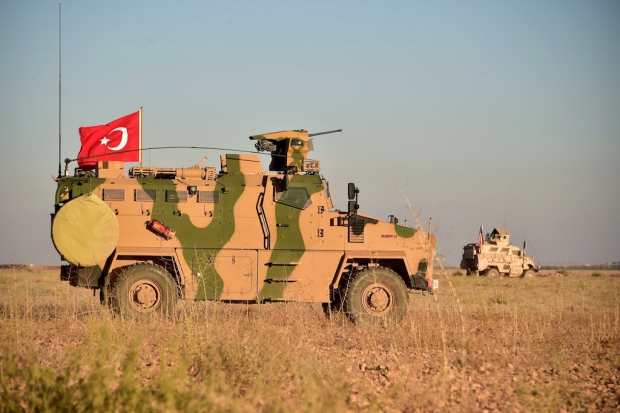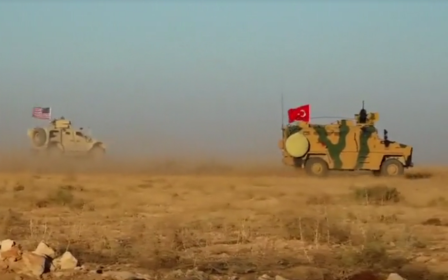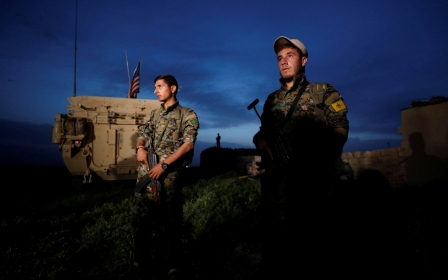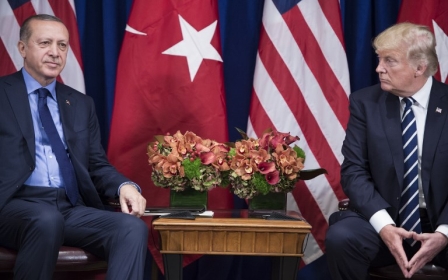Will meeting of Erdogan and Trump in Paris mend US-Turkish ties?
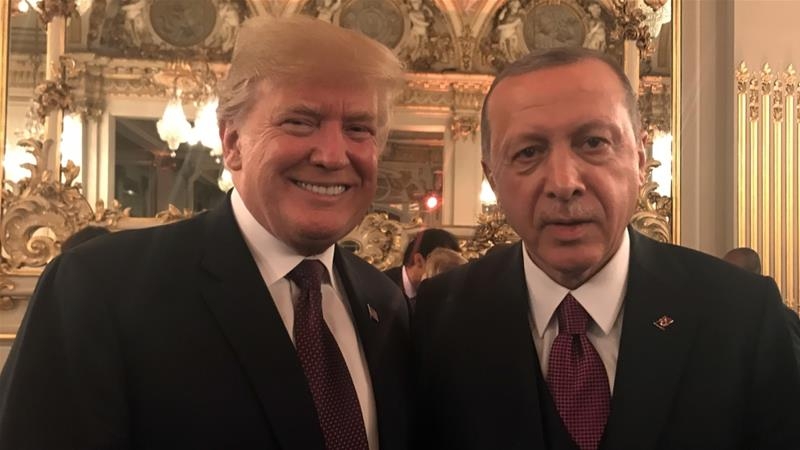
US President Donald Trump and his Turkish counterpart Recep Tayyip Erdogan spoke over dinner in Paris on Saturday, with one Turkish presidential source saying ahead of the encounter that there was a "determination" to try and rebuild ties as tensions continue over US support for pro-Kurdish forces in northern Syria.
The meeting between the two leaders took place as heads of state gathered over the weekend in the French capital to mark the World War One Armistice centenary.
The dinner was hosted by French President Emanuel Macron and attended by the world leaders and their spouses who had come to the French capital to take part in the event
A White House official said on Sunday that Trump and Erdogan had discussed how to respond to the killing of the journalist Jamal Khashoggi in the Saudi consulate in Istanbul last month.
Relations between Turkey and the United States reached almost rock bottom this summer as politicians exchanged a war of words over the case of American evangelical pastor Andrew Brunson, who was sentenced to two years on terrorism charges.
On 12 October, Brunson was allowed to walk free taking into account time already served, as Turkey sought to build an international consensus over the murder of Khashoggi, a critic of the Saudi government. Brunson's release saw the strained relations between the two countries begin to ease.
“During the Brunson process at one point, Americans took an attitude of almost not engaging with us," said the Turkish presidential source, speaking to Middle East Eye before the two leaders met in Paris.
"After his release, we can say we returned to a determination to improve ties.”
Only after Ankara reiterated promises to launch a military offensive on the east of the Euphrates River and struck targets there at the end of October did joint patrols in Manbij by the two NATO allies commence
The presidential source said that despite communication channels between Trump and Erdogan remaining open, heightened tensions had stymied efforts to achieve concrete results.
"The leaders of both countries had a mutual understanding. They were both committed to improving ties. However whenever the leaders took a decision, the process on the American side petered out," the source said.
"There was a disconnect from the get-go. Different voices were heard from the Pentagon, from the State Department and from various other establishments there."
While Washington may have achieved its goal, the Turkish government has repeatedly stated that the main block in any full normalisation of diplomatic ties is the continued US support for the pro-Kurdish People's Protection Units (YPG) in northern Syria.
The US has long claimed the YPG - who operate as part of the Syrian Democratic Forces (SDF) - are an essential ally in the fight against the Islamic State (IS) in Syria, but Turkey considers it an extension of the outlawed Kurdistan Workers' Party (PKK) which is designated a terrorist group by Turkey, the US and the European Union.
On 6 November, the US State Department posted bounties totalling $12m for three senior PKK members, a move described by Turkish Defence Minister Hulusi Akar as positive but long overdue.
He added that it was impossible for Turkey to accept that on the one hand, the US was sending weapons and ammunition to the YPG by plane and truck, while on the other hand it was offering rewards for information on senior members of the PKK.
“We expect this to be fixed as soon as possible," he said to reporters accompanying him on a visit to Sudan on 7 November.
Another high-ranking official voicing Turkey’s suspicions was presidential aide Ibrahim Kalin. He said if the US move to impose bounties had been motivated to obscure Washington's on-going support of the YPG, the truth would eventually emerge.
"We expect the US to completely end its engagement with the PKK's Syrian arm, the YPG," Kalin said during a live broadcast on the Haberturk news channel hours after the announcement of the reward.
"They [the US administration] say they are making a distinction between the PKK, and the YPG and the Democratic Union Party (PYD), but they cannot fool us. We have told them many times that the organic link between them [the PKK and YPG/PYD] is not [purely] instrumental,” he added, referring to the YPG's political wing.
Manbij roadmap
Just five days before the US bounties on top PKK members, another improvement eagerly awaited by Ankara occured: Turkish and US troops began much-delayed joint patrols in the Syrian city of Manbij.
The town is on the west bank of the Euphrates and has been controlled by the YPG-affiliated Manbij Military Council since 2016.
Although the YPG claim to have pulled out of the city, Ankara has recently complained that the group still has a presence there. Turkey has declared that the area west of the Euphrates is a red line the YPG will not be allowed to cross.
Ankara has claimed the US is dragging its heels on the implementation of an agreed roadmap for Manbij. Only after Ankara reiterated promises to launch a military offensive on the east of the Euphrates River and struck targets there at the end of October did joint patrols in Manbij by the two Nato allies commence.
However, in a move that angered Erdogan, three days after the launch of these patrols, on 4 November, US soldiers patrolled the east of the Euphrates, near the Turkish border – this time in coordination with the YPG.
The US Government Special Representative for Syria James Jeffrey said that the US presence in the northeast aims to ensure an enduring defeat of IS. He added that they are aware of Turkey’s concerns:
“We tell the Turks what weapons we give those people. We give them only light weapons. That’s one reason why they have not been as successful recently against Daesh (IS) as they have been in the past,” Jeffrey said in a telephone briefing with a group of Turkish journalists on 7 November.
He added that they would execute the roadmap for Manbij, which envisages the withdrawal of the YPG forces to the east of the Euphrates.
Mutual determination from presidents
Erdogan said that he would raise the issue of the joint patrols of US soldiers and the YPG in his Paris meeting with Trump: “This can cause serious negative developments on the border. I believe Trump will stop this,” he told reporters in Parliament on 6 November.
At the lowest point of this summer's dispute in mid-August, Erdogan accused Trump of waging “economic war against the entire world” after the US decision to increase tariffs on Turkish steel and aluminum. This further heated the diplomatic crisis between the two countries following the arrest of Pastor Brunson.
For his part, Trump said that he felt personally let down by Erdogan over his refusal to release the pastor.
US officials are having tough negotiations in Ankara over every single item related to Iran sanctions. Apart from that Turkey is in need of cheap oil from Iran. So there is a potential problem area there for US-Turkey ties
- Serhan Afacan, Center for Iranian Studies
Following Brunson’s release the leaders had two separate telephone conversations within 10 days, one on 21 October and the other one on 1 November. According to statements from their offices, the leaders underlined their determination to take affirmative steps to strengthen relations.
Erdogan subsequently stated that during the second telephone conversation he also raised the issue of the state-owned Halkbank, an executive from which has been charged in New York over an alleged scheme to evade US sanctions on Iran.
Turkey maintains Halkbank did not violate the sanctions and has reportedly asked the US to withdraw the threatened fine.
Turkey’s president stated that Trump "said he would immediately instruct his ministers about this and the next day the US Secretary of Treasury called his Turkish counterpart," but it is not clear what the ministers discussed.
Turkey rejects Iran sanctions
Meanwhile, the US government granted Turkey a 180-day waiver on Iranian oil imports in the wake of new sanctions on 5 November targeting Iran's energy and financial sectors, along with its shipping industry.
Serhan Afacan of the Center for Iranian Studies in Ankara (IRAM) told MEE that the waiver had only been granted thanks to the release of Brunson. However, he added that the US government wants to hit Iran hard and may not prolong the exemption.
“US officials are having tough negotiations in Ankara over every single item related to Iran sanctions. Apart from that Turkey is in need of cheap oil from Iran. So there is a potential problem area there for US-Turkey ties,” said Afacan.
Erdogan also spoke out against the renewal of sanctions on Iran: "US sanctions on Iran are wrong. For us, they are steps aimed at unbalancing the world; we don't want to live in an imperialist world," he said on 6 November.
However, as Kilic Bugra Kanat, research director at the Turkish-government backed Foundation for Political, Economic and Social Research (SETA) in Washington DC, stated in a recent article, Turkey's purchase of S-400 missile defence systems from Russia could also severely impact Turkish-American relations.
So too could attempts to block Turkey’s acquiring of US F-35 fighter jets, despite the Joint Strike Fighter programme with Washington.
Such potential areas of disagreement may spoil the positive trend in relations, he wrote in Daily Sabah.
“These are mostly about Turkey's relations with two of its Astana partners, Iran and Russia. The future of relations will depend on the successful navigation of diplomacy around these minefields and the effective use of opportunities,” he said.
Ankara and Washington are also at odds on another issue: Turkey has repeatedly called for the US to extradite Pennsylvania-based Fethullah Gulen, whom Ankara accuses of ordering an attempted coup in 2016. Gulen denies the accusation and the US has taken no substantial steps on this matter.
Despite these points of contention, Jeffrey pointed out that Turkey and the US do have plenty of common ground.
“Turkey is not happy with Iran’s presence in Syria. Turkey is not happy with the nature of the Syrian government. So there’s a great deal of commonality of view between us and Turkey," he said.
Meanwhile, the presidential source said that despite this shared will, Ankara’s demands from the US are very clear – and that those expectations are not yet met.
New MEE newsletter: Jerusalem Dispatch
Sign up to get the latest insights and analysis on Israel-Palestine, alongside Turkey Unpacked and other MEE newsletters
Middle East Eye delivers independent and unrivalled coverage and analysis of the Middle East, North Africa and beyond. To learn more about republishing this content and the associated fees, please fill out this form. More about MEE can be found here.


